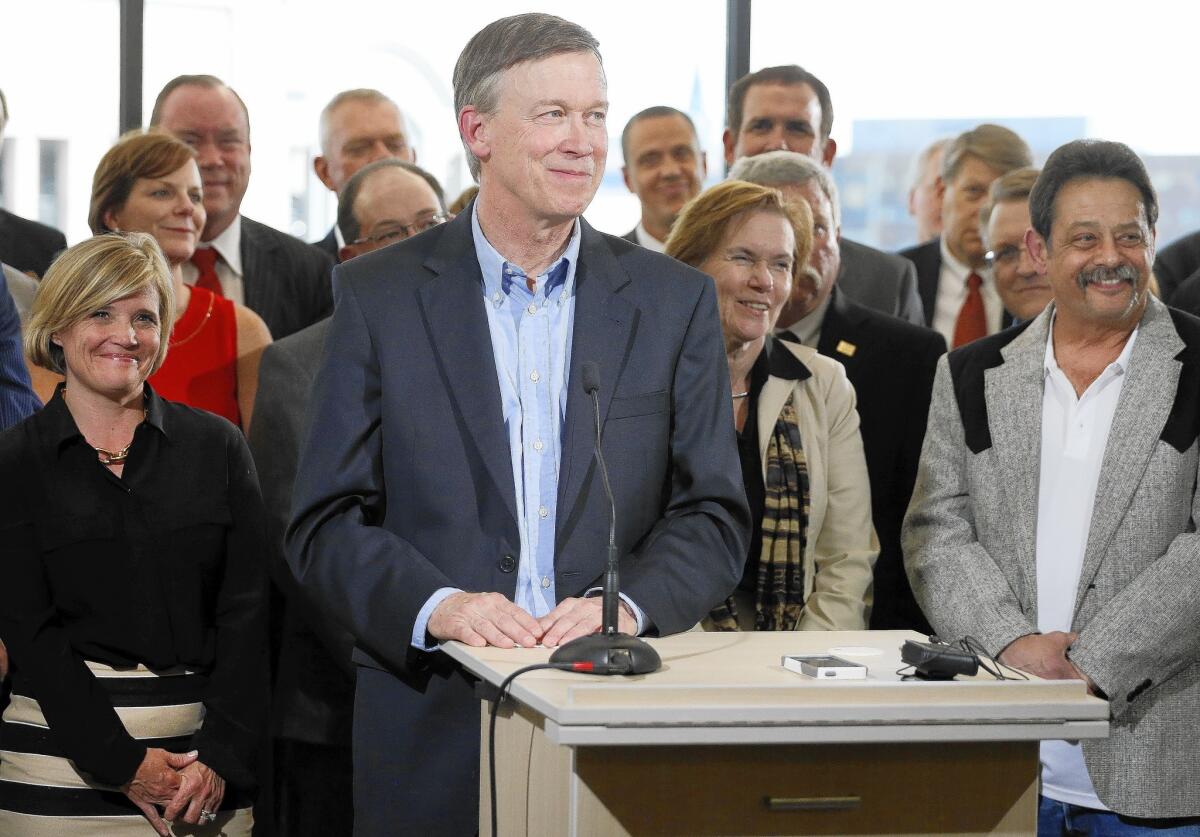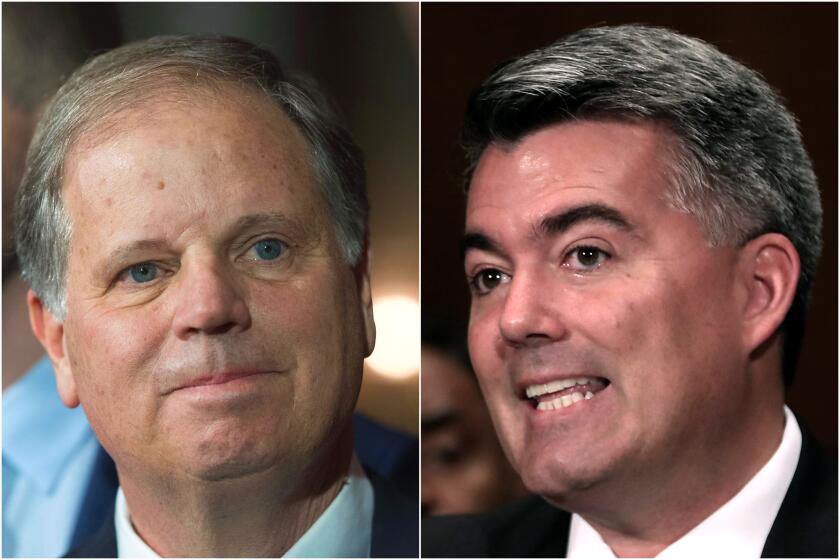John Hickenlooper ends presidential bid, considers U.S. Senate run in Colorado

- Share via
WASHINGTON — Former Colorado Gov. John Hickenlooper Thursday officially ended a presidential campaign that never got off the ground and said that he is seriously considering a run against Republican Sen. Cory Gardner.
“Today, I’m ending my campaign for president. But I will never stop believing that America can only move forward when we work together,” he said in a video message explaining his decision and thanking supporters. “People want to know what comes next for me. I’ve heard from so many Coloradans who want me to run for the United States Senate. They remind me how much is at stake for our country. And our state. I intend to give that some serious thought.”
A quirky businessman-turned-politician who failed to stand out in the crowded Democratic presidential primary field, Hickenlooper would be an immediate front-runner in another crowded field of Democratic Senate hopefuls eager to challenge Gardner, one of the most vulnerable GOP incumbents seeking reelection next year in a state where President Trump is deeply unpopular.
For months as Hickenlooper struggled to gain traction and raise money as a presidential candidate, he batted away questions about why he was running for president instead of challenging Gardner, saying at one point that he is “not cut out to be” a U.S. senator and repeatedly insisting that his skill set as an executive was a poor fit for a more deliberative role in Congress.
That line would no doubt be used against him should he run, although he is still considered an obvious front-runner in one of next year’s most competitive and important Senate contests.
Although more than a dozen candidates are already running, none are as familiar to Colorado voters or as battle-tested in statewide races as the former two-term governor and Denver mayor.
That’s the main reason Senate Minority Leader Charles E. Schumer (D-N.Y.) and the Democratic Senatorial Campaign Committee, desperate to flip three seats next November to gain back control of the Senate, have continued to court Hickenlooper, despite his public protestations that the job of being in the U.S. Senate “didn’t speak to” him.
Democrats need to gain three or four seats to take control in 2020. Republicans must defend 22 of 34 seats, but the lay of the land seems to favor the GOP.
As a presidential candidate, Hickenlooper only seemed to generate headlines when he misspoke: The former small-business owner refused to concede to MSNBC host Joe Scarborough that he was a “capitalist,” then flipped his messaging around and explicitly ran against socialism. The only memorable moment from his only nationally televised town hall involved him acknowledging having accidentally taken his mother to see the infamous pornographic film “Deep Throat.”
In July, he fired his campaign manager and communications director in an effort to revive his campaign, celebrating a poll that showed him at 2% as a major breakthrough.
But with the Democratic National Committee’s debate qualifying criteria of 130,000 individual donors preventing him — and several others — from appearing in next month’s debate, Hickenlooper began to look at the Senate race as an appealing off-ramp.
His exit from the presidential race likely signals the beginning of the field’s inevitable winnowing over the next few months. Several candidates will be forced to face political reality should they fall short of qualifying for future debates, including several senators and governors.
Among those who are likely to miss the cut for the September debate in Houston: Colorado Sen. Michael Bennet, Montana Gov. Steve Bullock and New York Sen. Kirsten Gillibrand. Others, like former HUD Secretary Julian Castro and Washington Gov. Jay Inslee, are closer to qualifying but have yet to do so.
Like Hickenlooper, Bullock has also been urged to consider running for Senate in Montana, as has former Rep. Beto O’Rourke, who narrowly lost a 2018 bid to unseat Texas Sen. Ted Cruz.
In El Paso on Thursday, O’Rourke delivered a speech seeking to reframe his longshot presidential bid as a bold, truth-telling mission to restore moral leadership and the American ideal of pluralism to the White House.
He also responded to calls that he’d be more effective in advancing the Democratic agenda as a top-tier candidate for the Senate. But doing so, O’Rourke said in his hometown 12 days after a mass shooting there, “would not be good enough for this community.”
He vowed to “take the fight directly to the source of this problem — that person who has caused this pain and placed this country in this moment of peril, and that is Donald Trump.”
The push to recruit Democrats to run for the Senate took another blow this week when Stacey Abrams, whose national profile rose last year when she narrowly lost a gubernatorial bid in Georgia, announced she would not run for the seat held by Republican Sen. David Perdue in order to focus on protecting and expanding voting rights.
That leaves the growing buzz around Hickenlooper as the Democrats’ main cause for optimism about the Senate battle, at least for now.
It stated a couple weeks ago when a Denver political consultant tied to Hickenlooper caused a stir when he bought several web domains that could be utilized for a Senate bid. And as the former governor considered his options while continuing to campaign for president in Iowa last week, a poll that showed him easily winning Colorado’s Democratic Senate primary and defeating Gardner by 12 percentage points was leaked to the news media.
When he left office in 2018, Hickenlooper maintained a high approval rating among Colorado voters, where his reputation is firmly established as a unique, consensus-driven politician who has refused to run negative campaign ads.
Despite the fondness for Hickenlooper back home, many of the Democrats already seeking the Senate nomination appear unlikely to step aside to clear the field for him if he declares his candidacy, and some may bristle at efforts by politicians in Washington to influence the race.
In the wide primary field, two candidates have already demonstrated an ability to raise money: former state Sen. Mike Johnston, a former educator from Denver, and Dan Baer, who was an Obama administration staffer.
John Walsh, who served as U.S. attorney in Denver during the Obama administration, is also running, as are Andrew Romanoff, a former statehouse speaker who has struggled to find a second act in politics since leaving the Legislature a decade ago, and Alice Madden, who served as House majority leader with Romanoff and also left public office in 2009.
Times staff writer Seema Mehta contributed to this report.
More to Read
Get the L.A. Times Politics newsletter
Deeply reported insights into legislation, politics and policy from Sacramento, Washington and beyond. In your inbox twice per week.
You may occasionally receive promotional content from the Los Angeles Times.












